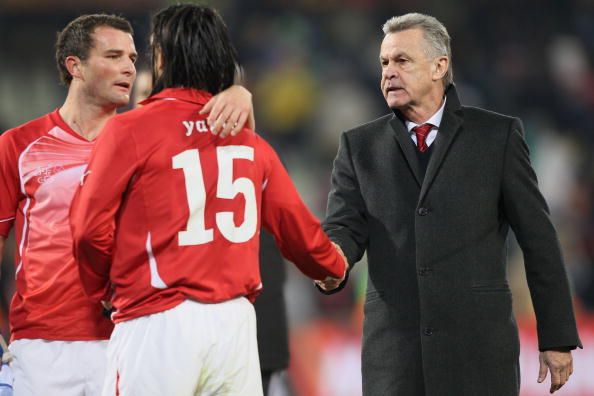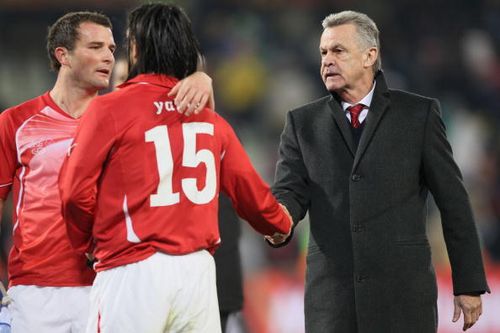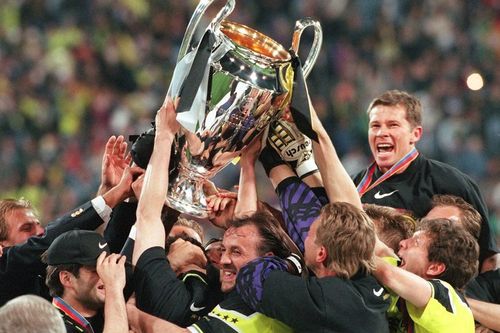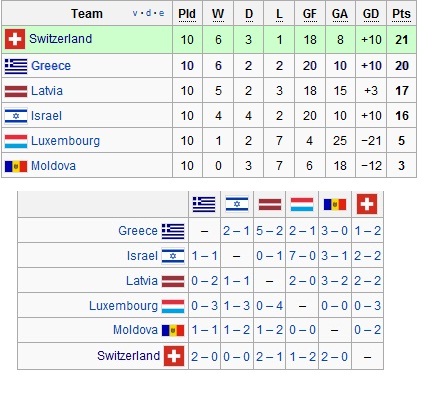
Legendary football Managers Part #1
Here I take a look at the recently retired Switzerland coach Ottmar Hitzfeld.
Ottmar Hitzfeld

They say that what goes round comes around. Justin Timberlake had even penned a 6-minute song on it. Well, none personified this adage better than the legendary German, whose legacy stretches from the little-known teams of the Swiss league to the popular heavyweights of Bayern Munich, and then the Switzerland national team, after which he permanently retired from the game. Let’s look at each of his incredible achievements in detail.
Pre-Managerial
Hitzfeld’s tryst with football began in the field, as a player. After playing for some years in the lower reaches of the Swiss football League, he got his big break in the form of FC Basel, where he played extremely well, finishing top scorer on two occasions. His good form for the club made him a club legend. Inevitably, like flies drawn to honey, scouts from the big clubs of that time hovered around Basel’s training ground, hoping to gain a lead on this precocious German striker. Finally, VfB Stuttgart won the race. Fans from the 1970s will remember the ‘100 goal’ season (whereby Hitzfeld and co. helped promotion to the Bundesliga by scoring 100 goals) with nostalgia.
After enjoying several seasons with Stuttgart, he rather bizarrely chose to return to Switzerland to play for relegation battlers FC Lugano. He then ended his time as a footballer by signing off with FC Luzern.
Hitzfeld’s stats for Germany are also not impressive. Being a striker in the times of Gerd Muller and Rudi Voller had its disadvantages, as he had to contend with staying on the bench for innumerable matches. In the end, he could only muster up 6 caps for his country. Not an impressive player, you would say. Well then, read ahead and find out what makes this guy such a legend.
Managerial Career
Trophies:
FC Aarau - Swiss Cup 1985
Grasshoppers Zurich – Swiss Super League 1990-91
Borussia Dortmund - Bundesliga 1995-96, Champions League 1997, DfB SuperCup 1996-97
Bayern Munich - Bundesliga 1999-00, 2003, 2008, Champions League 2001, German Cup 2008, DfB Pokal 2000,2003,2008
Just read the above list of trophies. Does it seem like it has been amassed by five coaches? Nope, not at all. It has all been the work of Hitzfeld, who single-handedly worked his way up the managerial ladder to become one of the greatest coaches football has ever had the privilege of seeing.
After retiring from professional football at the age of 34, Hitzfeld’s hopes of having a sabbatical were blown, as FC Zug (it doesn’t exist presently) wanted a big name to manage over it. Although historical records are a bit sketchy, we know that he achieved relative success with the club. That compelled FC Aarau to hire Hitzfeld, and in his four-year tenure at the club, procured the only Swiss Cup in the club’s history.
Grasshoppers Zurich came next, and he duly performed his magic again, winning consecutive league titles in 1990 and 1991. His reputation had only increased by the time German heavyweights Borussia Dortmund wanted to secure his services. What followed was a golden period in Dortmund’s history.
The driving force at the heart of the club’s success was Matthias Sammer, brought to the club from Inter in 1993. The last of the great German sweepers in the mould of Franz Beckenbauer, the man with the instantly recognisable shock of red hair was key to Hitzfeld’s approach, and in 1996 was reaching his prime. Along with Dortmund team-mates Moller, Kohler, Stefan Reuter and Steffen Freund, he was a member of the Germany squad that triumphed at Euro ’96 and was awarded the Ballon d’Or in the same year. What transpired was nothing short of legendary.
Dortmund had won the Bundesliga consecutively in 1995 and 1996, their first league titles in nearly 30 years, thus breaking the stranglehold of Bayern Munich on the domestic scene. The first of these titles, in the 1994-95 season, was won with one point to spare, the classy striker Michael Zorc contributing 15 goals. The second triumph was even more emphatic, Dortmund having established a clear 6-point gap between themselves and Bayern. Although they could not replicate the same feat in the 1996-97 season, they went one step further and became conquerors of Europe.
This talented Dortmund team embarked on an impressive run of form in their Champions League campaign in the 1996-97 season, finishing second to Atletico Madrid on goal difference in the group stage before sweeping past Auxerre 4-1 on aggregate in the quarter-finals, with midfielder Ricken, still just 20, scoring the only goal of the game in the second leg in France. In the semi-final against Manchester United, Ricken replicated the feat, silencing Old Trafford as Dortmund completed a 2-0 aggregate win against Alex Ferguson’s side. In the finals, they faced Juventus, who were boasting the likes of Zidane, Didier Deschamps, Del Piero and Christian Vieri. Dortmund had a tough job on their hands, hoping to beat a side that had utterly dominated Italian football in recent seasons. AND, they were the defending champions of the Champions League.
Juventus started the game brightly, dominating possession and having lots of shots on goals. If not for the revered Sammer, they would have conceded a dozen within the opening half-hour. That’s when the boot came onto the other foot.
Karl-Heinze Riedle struck twice in five minutes to send the yellow-and-black crowd into hysteria, the Turin supporters unable to comprehend what had happened. Del Piero got one back for Juventus when he exquisitely flicked Boksic’s cross into the net. 2-1, with 26 minutes left. Surely, Juventus would make a comeback? That was not to be, as 20-year old Lars Ricken came on in place of Stephane Chaupisat.
As soon as he entered the field, he was put on goal by a lovely through-ball by Andreas Moller, and Ricken astonishingly chipped the Juventus ‘keeper from more than 20 yards out, with his first touch of the ball, within 16 seconds of entering the field. 3-1. Game over. Dortmund had won their first European title in 31 years.

After steering Dortmund to glorious success and establishing them at the pinnacle of footballing greatness, Hitzfeld moved on to Bayern Munich, succeeding Giovanni Trapattoni, where he continued his faiytale run by leading them to the Bundesliga in 1999 and 2000. The 1999 season would be more famous for the epic Champions League final between Bayern and Manchester United. The German powerhouses led 1-0 till the 90th minute of normal time, and were sure to clamp their hands on that prestigious trophy. But the never-say-die attitude of United paid dividends as Sheringham and super-sub Solskjaer scored off two consecutive corners to snatch victory from the jaws of defeat.
Hitzfeld did not waste time rueing the trophy that had slipped out of his hands. Instead, he focused on the next season, and his efforts paid off as Bayern won the Double, another Bundesliga, and the Champions League which had so cruelly eluded them the previous year. In doing so, Hitzfeld became the first coach to win the Champions League with two different clubs (Jose Mourinho achieving the same feat later in 2010). In addition to the plaudits received, he was also voted ‘World Manager of the Year’ for the second time, the first time in the 1996-97 season, when he won the Champions League with Borussia Dortmund.
But the 2002-03 season marked the beginning of the end for the legendary coach’s tenure. Although they won the league title, the frequent infightings and lack of harmony within the dressing room did not make for pleasant headlines. The Board were not satisfied by his conduct and perceived lack of man-management, and sacked Hitzfeld in 2004. But that didn’t stop FC Bayern fans from voting him as the ‘Greatest Ever FC Bayern München Coach’ in 2005. Truly an honour, considering the pedigree of the managers who had managed the club before him, and it only added to the indisputable fact that he was one of the greatest coaches to have ever graced the game.
But wait my friends! His story is still not over. After taking a brief hiatus from coaching, Hitzfeld made a shock return to Bayern in 2007, replacing Felix Magath. This time, he did not have as much of good fortune and Bayern could only manage a fourth-place at the end of the season, thus condemning the club to non-Champions League football for the first time in more than a decade. This disappointment only spurred Hitzfeld on, and he went on a spending spree at the start of the season, Altintop, Luca Toni, Miroslav Klose and Ribery all being added to the first-team roster.
These quality signings undoubtedly made a difference to the team, as they went on to win the Treble in the 2007-08 season. His last match in charge of Bayern was a humbling 4-0 defeat at the hands of Zenit St.Petersburg in the UEFA Cup. An ignominious end to what was a stellar career. Or so it seemed.
Remember the first line of this article? Well, it was about to be fulfilled by Hitzfeld. The man, whose career had begun in Switzerland, in the Swiss League, as a player, returned, this time a manger of the Swiss national team. He took over the reins from long-serving manger Kobi Kuhn in 2008. He ensured the smooth passage of Switzerland through the 2010 World Cup qualifiers. They were lucky in that they had a very easy group, composed of the minnows of Europe.

Switzerland were drawn in Group H, along with Spain, Honduras and Chile. Hitzfeld stayed true to his reputation of his teams being giant-killers, as they shockingly won the opening game of the group, 1-0, against the Euro 2008 winners Spain! He garnered a lot of praise for his tactical approach towards the tiki-taka possession football of Spain. His 4-2-3-1 stifled the Spain midfield, Inler and Huggel doing a very good job neutralizing the threat of Xavi and Iniesta.
Unfortunately, they could not repeat the same results in their following group games, losing 1-0 to Chile and drawing 0-0 with Honduras, which meant they could garner only 4 points, thus finishing third, behind Spain and Chile. He is all set to retire now, taking a permanent break from football to spend time with his family. A well-deserved break at that.!
Hitzfeld, in his 19-year career, has amassed over 30 trophies, and has been voted the ‘Greatest Bundesliga Coach of All-Time’, pushing Franz Beckenbauer into second spot. His exploits have gone down into club folklore, with Grasshoppers Zurich and Borussia Dortmund having proclaimed him as one of their immortal legends. We commemorate the man who put German football back on the map after achieving so much success on the European stage. Not since the era of Franz Beckenbauer has the Bundesliga seen a manager do so much for the game in Germany, and for this, if nothing else, Hitzfeld should be honoured.